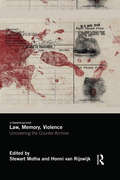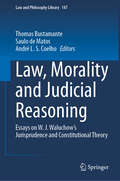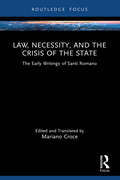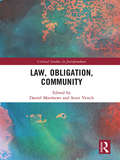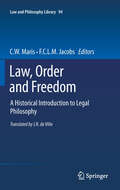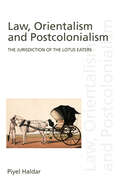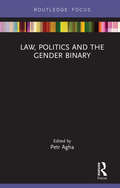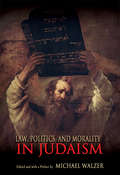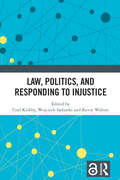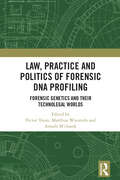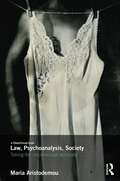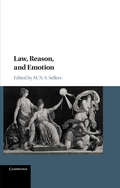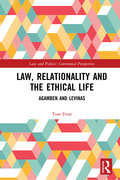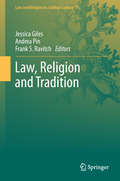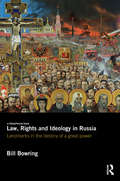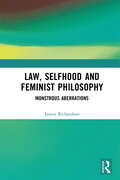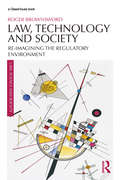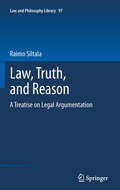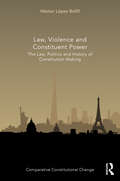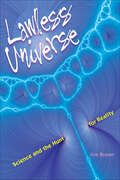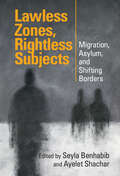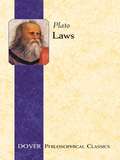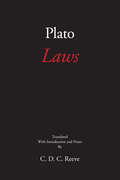- Table View
- List View
Law, Memory, Violence: Uncovering the Counter-Archive
by Stewart Motha Honni Van RijswijkThe demand for recognition, responsibility, and reparations is regularly invoked in the wake of colonialism, genocide, and mass violence: there can be no victims without recognition, no perpetrators without responsibility, and no justice without reparations. Or so it seems from law’s limited repertoire for assembling the archive after ‘the disaster’. Archival and memorial practices are central to contexts where transitional justice, addressing historical wrongs, or reparations are at stake. The archive serves as a repository or ‘storehouse’ of what needs to be gathered and recognised so that it can be left behind in order to inaugurate the future. The archive manifests law’s authority and its troubled conscience. It is an indispensable part of the liberal legal response to biopolitical violence. This collection challenges established approaches to transitional justice by opening up new dialogues about the problem of assembling law’s archive. The volume presents research drawn from multiple jurisdictions that address the following questions. What resists being archived? What spaces and practices of memory - conscious and unconscious - undo legal and sovereign alibis and confessions? And what narrative forms expose the limits of responsibility, recognition, and reparations? By treating the law as an ‘archive’, this book traces the failure of universalised categories such as 'perpetrator', 'victim', 'responsibility', and 'innocence,' posited by the liberal legal state. It thereby uncovers law’s counter-archive as a challenge to established forms of representing and responding to violence.
Law, Morality and Judicial Reasoning: Essays on W. J. Waluchow’s Jurisprudence and Constitutional Theory (Law and Philosophy Library #147)
by Thomas Bustamante Saulo De Matos André L. S. CoelhoThis book provides a critical outlook on, and an inquiry into the practical implications of, the works of Professor W.J. Waluchow, one of the most important jurisprudence scholars of the early twenty-first century, while also reflecting on the interconnections between his legal theory and his theory of constitutional interpretation. It also features an interview with Waluchow, in which he responds to some of the chapters and shares a first-person perspective on his main philosophical ideas, how they emerged, and how they can be further developed and applied. The book makes a valuable contribution to contemporary legal philosophy by asking and providing different answers (from prominent legal philosophers and newer scholars in the field) to questions such as ‘How does Waluchow’s jurisprudence relate to his theories of legal reasoning and constitutional interpretation?’, ‘On what terms should we understand inclusive legal positivism?’, ‘Can inclusive legal positivism be reconciled with an interpretivist theory of adjudication?’, ‘How does it compare with Raz’s model of legal authority?’, ‘Can Waluchow’s notion of “community constitutional morality” be applied to contexts such as international law, pluralist legal communities, and indigenous laws?’, and ‘Is Waluchow’s methodology equipped to provide interpretive directives in unstable and extremely unequal legal systems?’. The chapters, all written by experts on jurisprudence (including some of the scholars who helped develop the tradition known as inclusive legal positivism), offer a unique analysis of Waluchow’s most complex and intriguing theses, providing not only a valuable exegetical analysis of his work but also a range of answers to the challenge of interpreting legal and constitutional values, as well as practical resolutions to persisting controversies in the philosophy of law.
Law, Necessity, and the Crisis of the State: The Early Writings of Santi Romano (Law and Politics)
by Mariano CroceThis book contains the first English translations of Santi Romano’s important essays, ‘On the Decree Laws and the State of Siege During the Earthquakes in Messina and Reggio Calabria’ (1909) and ‘The Modern State and its Crisis’ (1910). Before Santi Romano wrote his masterpiece The Legal Order in 1917–18, he lay the foundations for his ground-breaking theory of law in these two essays, which are still central to scholarly debates about his legacy. The main focus of ‘On the Decree Laws’ is the concept of necessity as a source of law. Such a controversial view anticipated the much more renowned conception of the state of exception advanced later by Carl Schmitt in his Political Theology and has provided a reference point for Giorgio Agamben. The second essay, ‘The Modern State and its Crisis’, is concerned with the emergence of social forces that the early 20th-century administrative state was struggling to tame. Pursuing an insight that he would develop in The Legal Order, Romano argued that a solution could be found in a public law theory that was able to reconcile the need for a shared constitutional frame with the internal orderings of nonstate movements. Indispensable for contemporary scholars to understand how Romano’s most revolutionary notions came about, as well as to fully appreciate the theoretical import of his concept of law, this book will appeal to legal and political theorists and others who are interested in how law deals and should deal with emergencies and social crises.
Law, Obligation, Community (Critical Studies in Jurisprudence)
by Scott Veitch Daniel MatthewsAgainst an ever-expanding and diversifying ‘rights talk’, this book re-opens the question of obligation from not only legal but also ethical, sociological and political perspectives. Its premise is that obligation has a primacy ahead of rights, because rights attach to practices and modes of being that are already saturated with obligations. Obligations thus lie at the core not just of law but of community. Yet the distinctive meanings, range and situations of obligation have tended to remain under-theorised in legal scholarship. In response, this book examines the sense in which we are multiply ‘bound beings’, to law and legal institutions, as much as we are to place, community, memory and the various social institutions that give shape to collective life. Sharing this set of concerns, each of the international group of scholars contributing to this volume traces the specificity of the binding force of obligations, their techniques and modes of expression, as well as their centrally important role in giving form to lawful relations. Together they provide an innovative and challenging contribution to legal scholarship: one that will also be of relevance to those working in politics, philosophy and social theory.
Law, Order and Freedom
by J.R. de Ville C. W. Maris F.C.L.M. JacobsThe central question in legal philosophy is the relationship between law and morality. The legal systems of many countries around the world have been influenced by the principles of the Enlightenment: freedom, equality and fraternity. The position is similar in relation to the accompanying state ideal of the democratic constitutional state as well as the notion of a welfare state. The foundation of these principles lies in the ideal of individual autonomy. The law must in this view guarantee a social order which secures the equal freedom of all. This freedom is moreover fundamental because in modern pluralistic societies a great diversity of views exist concerning the appropriate way of life. This freedom ideal is however also strongly contested. In Law, Order and Freedom, a historical overview is given pertaining to the question of the extent to which the modern Enlightenment values can serve as the universal foundation of law and society.
Law, Orientalism and Postcolonialism: The Jurisdiction of the Lotus-Eaters
by Piyel HaldarFocusing on the ‘problem’ of pleasure Law, Orientalism and Postcolonialism uncovers the organizing principles by which the legal subject was colonized. That occidental law was complicit in colonial expansion is obvious. What remains to be addressed, however, is the manner in which law and legal discourse sought to colonize individual subjects as subjects of law. It was through the permission of pleasure that modern Western subjects were refined and domesticated. Legally sanctioned outlets for private and social enjoyment instilled and continue to instil within the individual tight self-control over behaviour. There are, however, states of behaviour considered to be repugnant to, and in excess of, modern codes of civility. Drawing on a broad range of literature, (including classical jurisprudence, eighteenth century Orientalist scholarship, early travel literature, and nineteenth century debates surrounding the rule of law), yet concentrating on the experience of British India, the argument here is that such excesses were deemed to be an Oriental phenomenon. Through the encounter with the Orient and with the fantasy of its excess, Piyel Haldar concludes, the relationship between the subject and the law was transformed, and must therefore be re-assessed.
Law, Politics and the Gender Binary
by Petr AghaThe distinction between male and female, or masculinity and femininity, has long been considered to be foundational to society and the organization of its institutions. In the last decades, the massive literature on gender has challenged this discursive construction. Gender has been disassembled and reassembled, variously considered as social practice, performance, ideology. Yet the binary relationship ‘man/woman’ continues to be a characteristic trait of Western societies. This book gathers together contributions by experts in various fields – including law, sociology, philosophy and anthropology – to pin down the relationship between institutions and the gender binary. Centrally, it examines the way in which the present-day gender binary is shored up by the conceptualization and regulation of sex and gender at societal and institutional levels. Based on this examination, it tackles the issue of what the practices and processes of subjectivation are that preserve this binary distinction as the foundation of gender. Each of the chapters discusses this pressing question with a view to considering whether current equality policies challenge hierarchical and hegemonic understandings of gender or are the residue of a sexist understanding of gender. This analysis then paves the way for a more general and crucial question: whether institutions can, or should, contribute to the process of deconstructing the gender binary.
Law, Politics, and Morality in Judaism (Ethikon Series in Comparative Ethics)
by Michael WalzerJewish legal and political thought developed in conditions of exile, where Jews had neither a state of their own nor citizenship in any other. What use, then, can this body of thought be today to Jews living in Israel or as emancipated citizens in secular democratic states? Can a culture of exile be adapted to help Jews find ways of being at home politically today? These questions are central in Law, Politics, and Morality in Judaism, a collection of essays by contemporary political theorists, philosophers, and lawyers. How does Jewish law accommodate--or fail to accommodate--the practice of democratic citizenship? What range of religious toleration and pluralism is compatible with traditional Judaism? What forms of coexistence between Jews and non-Jews are required by shared citizenship? How should Jews operating within halakha (Jewish law) and Jewish history judge the use of force by modern states? The authors assembled here by prominent political theorist Michael Walzer come from different points on the religious-secular spectrum, and they differ greatly in their answers to such questions. But they all enact the relationship at issue since their answers, while based on critical Jewish texts, also reflect their commitments as democratic citizens. The contributors are Michael Walzer, David Biale, the late Robert M. Cover, Menachem Fisch, Geoffrey B. Levey, David Novak, Aviezer Ravitzky, Adam B. Seligman, Suzanne Last Stone, and Noam J. Zohar.
Law, Politics, and Perception: How Policy Preferences Influence Legal Reasoning (Constitutionalism and Democracy)
by Eileen BramanAre judges' decisions more likely to be based on personal inclinations or legal authority? The answer, Eileen Braman argues, is both. Law, Politics, and Perception brings cognitive psychology to bear on the question of the relative importance of norms of legal reasoning versus decision markers' policy preferences in legal decision-making. While Braman acknowledges that decision makers' attitudes--or, more precisely, their preference for policy outcomes--can play a significant role in judicial decisions, she also believes that decision-makers' belief that they must abide by accepted rules of legal analysis significantly limits the role of preferences in their judgements. To reconcile these competing factors, Braman posits that judges engage in "motivated reasoning," a biased process in which decision-makers are unconsciously predisposed to find legal authority that is consistent with their own preferences more convincing than those that go against them. But Braman also provides evidence that the scope of motivated reasoning is limited. Objective case facts and accepted norms of legal reasoning can often inhibit decision makers' ability to reach conclusions consistent with their preferences.
Law, Politics, and Responding to Injustice
by Wojciech Sadurski Kevin Walton Coel KirkbyThis book examines the issue of injustice, and our responses to it, in a range of contemporary contexts.In her ground-breaking book The Faces of Injustice (1990), Judith Shklar draws attention to our tendency to view injustice as an abnormality. Of course it is not: injustice is ubiquitous. But how should we respond to it? The book brings together leading legal and political theorists to explore the nature of injustice, its relationship to law, and responses to it, in a variety of contexts. Their chapters cover issues such as protest, resistance, violence, the moral obligation to obey the law, civil disobedience, democratic reform, and transitional justice. They all, though, share a concern to examine such issues through a Shklar-inspired focus on injustice.This book will appeal to academics and advanced students in law, politics, and philosophy.
Law, Practice and Politics of Forensic DNA Profiling: Forensic Genetics and their Technolegal Worlds
by Matthias Wienroth Victor Toom Amade M’charekThis collection reviews developments in DNA profiling across jurisdictions with a focus on scientific and technological developments as well as their political, ethical, and socio-legal aspects. Written by leading scholars in the fields of social studies of forensic science, science and technology studies and socio-legal studies, the book provides state-of-the-art analyses of forensic DNA practices in a diverse range of jurisdictions, new and emerging forensic genetics technologies and issues of legitimacy. The work articulates the various forms of technolegal politics involved in the everyday, standardised and emerging practices of forensic genetics and engages with the most recent scholarly and policy literature. In analyses of empirical cases, and by taking into account the most recent technolegal developments, the book explores what it means to live in a world that is increasingly governed through anticipatory crime control and its related risk management and bio-surveillance mechanisms, which intervene with and produce political and legal subjectivities through human bodies in their DNA. This volume is an invaluable resource for those working in the areas of social studies of forensic science, science and technology studies, socio-legal studies, sociology, anthropology, ethics, law, politics and international relations.
Law, Psychoanalysis, Society: Taking the Unconscious Seriously
by Maria Aristodemou'I swear to tell the truth, the whole truth, and nothing but the truth' we say in a court of law. 'In a court of law, the truth is precisely what we will not say', says Lacan. ‘If God is dead, everything is permitted’, writes Dostoyevsky. ‘If God is dead, everything is prohibited’, responds Lacan. ‘I think, therefore I am’, reasons Descartes. ‘I am where I do not think’, concludes Lacan. What are we to make of Lacan’s inversions of these mottos? And what are the implications for the legal system if we take them seriously? This book puts the legal subject on the couch and explores the incestuous relationship between law and desire, enjoyment and transgression, freedom and subjection, ethics and atheism. The process of analysis problematizes fundamental tenets of the legal system, leading the patient to rethink long-held beliefs: terms like ‘guilt’ and ‘innocence’, ‘truth’ and ‘lies’, ‘reason’ and ‘reality’, ‘freedom’ and ‘responsibility’, ‘cause’ and ‘punishment’, acquire new and surprising meanings. By the end of these sessions, the patient is left wondering, along with Freud her analyst, whether ‘it is not psychology that deserves the mockery but the procedure of judicial enquiry’. A unique study on the nexus of Law and Psychoanalysis, this book will interest students and scholars of both subjects, as well as general readers looking to explore this perverse and fascinating relationship.
Law, Reason, and Emotion
by M. N. S. SellersThis book examines the role and importance of reason and emotion in justice and the law. Eight lawyers and philosophers of law consider law's basis in the universal human need for society, our innate sense of justice, and many other powerful inclinations and emotions, including the desire for fairness and even for law itself. Human beings are deeply social creatures, inspired by social and other emotions, which can ennoble, support, or undermine the law. Law gains legitimacy and effectiveness when reason recognizes and embraces human emotions for the benefit of society as a whole. This volume explores the power and purposes of reason and emotion in the law. Explores the relationships between law and reason, emotion and the law, and reason and emotion. Argues that reason and human emotion are not conflicting values in a well-constructed legal system, but rather the joint basis of justice in the law. Simplifies legal vocabulary through accessible definitions of the most common terms used when discussing reason, emotion and justice in the law.
Law, Relationality and the Ethical Life: Agamben and Levinas (Law and Politics)
by Tom FrostThis first book-length study into the influence of Emmanuel Levinas on the thought and philosophy of Giorgio Agamben, Law, Relationality and the Ethical Life, demonstrates how Agamben’s immanent thought can be read as presenting a compelling, albeit flawed, alternative to Levinas’s ethics of the Other. The publication of the English translation of The Use of Bodies in 2016 ended Giorgio Agamben’s 20-year multi-volume Homo Sacer study. Over this time, Agamben’s thought has greatly influenced scholarship in law, the wider humanities and social sciences. This book places Agamben’s figure of form-of-life in relation to Levinasian understandings of alterity, relationality and the law. Considering how Agamben and Levinas craft their respective forms of embodied existence – that is, a fully-formed human that can live an ethical life – the book considers Agamben’s attempt to move beyond Levinasian ethics through the liminal figures of the foetus and the patient in a persistent vegetative state. These figures, which Agamben uses as examples of bare life, call into question the limits of Agamben’s non-relational use and form of existence. As such, it is argued, they reveal the limitations of Agamben’s own ethics, whilst suggesting that his ‘abandoned’ project can and must be taken further. This book will be of interest to scholars, researchers, graduate students and anyone with an interest in the thought of Giorgio Agamben and Emmanuel Levinas in the fields of law, philosophy, the humanities and the social sciences.
Law, Religion and Tradition (Law and Religion in a Global Context #1)
by Frank S. Ravitch Jessica Giles Andrea PinThis book explores different theories of law, religion, and tradition, from both a secular and a religious perspective. It reflects on how tradition and change can affect religious and secular legal reasoning, identifying the patterns of legal evolution within religious and secular traditions.It is often taken for granted that, even in law, change corresponds and correlates to progress – that things ought to be changed and they will necessarily get better. There is no doubt that legal changes over the centuries have made it possible to enhance the protection of individual rights and to somewhat contain the possibility of tyranny and despotism. But progress is not everything in law: stability and certainty lie at the core of the rule of law. Similarly, religions and religious laws could not survive without traditions; and yet, they still evolve, and their evolution is often intermingled with secular law.The book asks (and in some ways answers) the questions: What is the role of tradition within religions and religious laws? What is the impact of religious traditions on secular laws, and vice-versa? How are the elements of tradition to be identified? Are they the same within the secular and the religious realm? Do secular law and religious law follow comparable patterns of change? Do their levels of resilience differ significantly? How does the history of religion and law affect changes within religious traditions and legal systems?The overall focus of the book addresses the extent to which tradition plays a role in shaping and re-shaping secular and religious laws, as well as their mutual boundaries.
Law, Rights and Ideology in Russia: Landmarks in the Destiny of a Great Power
by Bill BowringLaw, Rights and Ideology in Russia: Landmarks in the destiny of a great power brings into sharp focus several key episodes in Russia’s vividly ideological engagement with law and rights. Drawing on 30 years of experience of consultancy and teaching in many regions of Russia and on library research in Russian-language texts, Bill Bowring provides unique insights into people, events and ideas. The book starts with the surprising role of the Scottish Enlightenment in the origins of law as an academic discipline in Russia in the eighteenth century. The Great Reforms of Tsar Aleksandr II, abolishing serfdom in 1861 and introducing jury trial in 1864, are then examined and debated as genuine reforms or the response to a revolutionary situation. A new interpretation of the life and work of the Soviet legal theorist Yevgeniy Pashukanis leads to an analysis of the conflicted attitude of the USSR to international law and human rights, especially the right of peoples to self-determination. The complex history of autonomy in Tsarist and Soviet Russia is considered, alongside the collapse of the USSR in 1991. An examination of Russia’s plunge into the European human rights system under Yeltsin is followed by the history of the death penalty in Russia. Finally, the secrets of the ideology of ‘sovereignty’ in the Putin era and their impact on law and rights are revealed. Throughout, the constant theme is the centuries long hegemonic struggle between Westernisers and Slavophiles, against the backdrop of the Messianism that proclaimed Russia to be the Third Rome, was revived in the mission of Soviet Russia to change the world and which has echoes in contemporary Eurasianism and the ideology of sovereignty.
Law, Selfhood and Feminist Philosophy: Monstrous Aberrations
by Janice RichardsonAt the intersection of law, feminism and philosophy, this book analyses the ways in which certain bodies and ‘selves’ continue to be treated as monstrous aberrations from the ‘ideal’ figure or norm. Employing contemporary feminist philosophy to rethink accepted legal ideas, the book is divided into three sections. The first focuses on the different relational ontologies of philosophers Adriana Cavarero and Christine Battersby – also considering their work via a third term: Spinoza. The second turns to diverse feminist engagements with the social contract theorists. The third section employs insights from throughout the book to focus more explicitly on law – and, in particular privacy law and the so-called ‘wrongful birth’ cases. Bringing together more than twenty years of sustained reflection, this book offers an insightful account of how contemporary feminist philosophy can contribute to a richer understanding of law. It will be of enormous interest to scholars and students working in the areas of legal theory, feminist thought and philosophy.
Law, Technology and Society: Reimagining the Regulatory Environment (Law, Science and Society)
by Roger BrownswordThis book considers the implications of the regulatory burden being borne increasingly by technological management rather than by rules of law. If crime is controlled, if human health and safety are secured, if the environment is protected, not by rules but by measures of technological management—designed into products, processes, places and so on—what should we make of this transformation? In an era of smart regulatory technologies, how should we understand the ‘regulatory environment’, and the ‘complexion’ of its regulatory signals? How does technological management sit with the Rule of Law and with the traditional ideals of legality, legal coherence, and respect for liberty, human rights and human dignity? What is the future for the rules of criminal law, torts and contract law—are they likely to be rendered redundant? How are human informational interests to be specified and protected? Can traditional rules of law survive not only the emergent use of technological management but also a risk management mentality that pervades the collective engagement with new technologies? Even if technological management is effective, is it acceptable? Are we ready for rule by technology? Undertaking a radical examination of the disruptive effects of technology on the law and the legal mind-set, Roger Brownsword calls for a triple act of re-imagination: first, re-imagining legal rules as one element of a larger regulatory environment of which technological management is also a part; secondly, re-imagining the Rule of Law as a constraint on the arbitrary exercise of power (whether exercised through rules or through technological measures); and, thirdly, re-imagining the future of traditional rules of criminal law, tort law, and contract law.
Law, Truth, and Reason
by Raimo SiltalaThis book is an innovative contribution to analytical jurisprudence. It is mainly based on the distinct premises of linguistic philosophy and Carnapian semantics, but also addresses the issues of institutional philosophy, social pragmatism, and legal principles as envisioned by Dworkin, among others. Wróblewski´s three ideologies (bound/free/legal and rational) and Makkonen´s three situations (isomorphic/semantically vague/normative gap) of judicial decision-making are further developed by means of 10 frames of legal analysis as discerned by the author. With the philosophical theories of truth serving as a reference, the frames of legal analysis include the isomorphic theory of law (Wittgenstein, Makkonen), the coherence theory of law (Alexy, Peczenik, Dworkin), the new rhetoric and legal argumentation theory (Perelman, Aarnio), social consequentialism (Posner), natural law theory (Fuller, Finnis), and the sequential model of legal reasoning by Neil MacCormick and the Bielefelder Kreis. At the end, some key issues of legal metaphysics are addressed, like the notion of legal systematics and the future potential of the analytical approach in jurisprudence.
Law, Violence and Constituent Power: The Law, Politics And History Of Constitution Making (Comparative Constitutional Change)
by Héctor López BofillThis book challenges traditional theories of constitution-making to advance an alternative view of constitutions as being founded on power which rests on violence. The work argues that rather than the idea of a constitution being the result of political participation and deliberation, all power instead is based on violence. Hence the creation of a constitution is actually an act of coercion, where, through violence, one social group is able to impose itself over others. The book advocates that the presence of violence be used as an assessment of whether genuine constitutional transformation has taken place, and that the legitimacy of a constitutional order should be dependent upon the absence of killing. The book will be essential reading for academics and researchers working in the areas of constitutional law and politics, legal and political theory, and constitutional history.
Lawless Universe: Science and the Hunt for Reality
by Joe RosenCan science fully comprehend the whole of the material universe? Not according to Joe Rosen.There is no question that advancements in science—especially in physics—have radically changed our concept of nature, revolutionizing our view of the universe, even of reality itself. Rosen argues, though, that the material universe in its entirety lies beyond science. Anyone who claims otherwise, who proposes a scientific Theory of Everything to explain all aspects and phenomena of nature, only misleads and misinforms. Taking science—and the scientific method—down a peg, Rosen asserts that any understanding of the whole universe, if it is to be found at all, can come only from outside science, from nonscientific modes of comprehension and insight. He believes that popularizers of science—think Stephen Hawking and Richard Dawkins—are mistaken when they declare that science is on the verge of unlocking all the secrets of the universe. Perhaps without realizing it, they have crossed into the realm of metaphysics in an attempt to explain the unexplainable. In Lawless Universe Rosen explores just how far science can go in comprehending nature. He considers the separate—but entangled—domains of science and metaphysics and examines the all-too-often ignored boundary between the objective and the subjective. Thought-provoking and controversial, Lawless Universe is a complement to, even an antidote for, books that create the misimpression that science can explain everything.
Lawless Universe: Science and the Hunt for Reality
by Joe RosenIn this provocative reassessment of science, a physicist questions whether it can ever fully comprehend the entire material universe.There is no question that modern science has radically advanced our understanding of nature, the universe, and even reality itself. But in Lawless Universe, theoretical physicist Joe Rosen takes the scientific method down a peg. In his estimation, people like Stephen Hawking and Richard Dawkins are wrong to declare that science is on the verge of unlocking all the secrets of the universe. Perhaps without realizing it, they have crossed into the realm of metaphysics in an attempt to explain the unexplainable. Rosen considers the separate but entangled domains of science and metaphysics and examines the all-too-often ignored boundary between the objective and the subjective. He asserts that any understanding of the whole universe, if it is to be found at all, must come from nonscientific modes of comprehension and insight.
Lawless Zones, Rightless Subjects: Migration, Asylum, and Shifting Borders
by Seyla Benhabib Ayelet ShacharResponding to ever-increasing pressures of migration, states, supranational, and subnational actors deploy complex moves and maneuvers to reconfigure borders, rights, and territory, giving rise to a changing legal cartography of international relations and international law. The purpose of this volume is to study this new reconfiguration of rights, territoriality, and jurisdiction at the empirical and normative levels and to examine its implications for the future of democratic governance within and across borders. Written by a diverse and accomplished group of scholars, the chapters in this volume employ legal, historical, philosophical, critical, discursive, and postcolonial perspectives to explore how the territoriality of the modern states – ostensibly, the most stable and unquestionable element undergirding the current international system – has been rewritten and dramatically reimagined. This title is also available as Open Access on Cambridge Core.
Laws
by Plato Benjamin JowettA lively dialogue between a foreign philosopher and a powerful statesman, Plato's Laws reflects the essence of the philosopher's reasoning on political theory and practice. It also embodies his mature and more practical ideas about a utopian republic. Plato's discourse ranges from everyday issues of criminal and matrimonial law to wider considerations involving the existence of the gods, the nature of the soul, and the problem of evil. This translation of Plato's Laws by the distinguished scholar Benjamin Jowett is an authoritative choice for students of philosophy, political science, and literature. It is included among Dover Publications' Philosophical Classics, a series that comprises the major works of ancient and modern world philosophy. Low-priced, high-quality, and unabridged, these editions are ideal for teachers and students as well as for general readers.
Laws (Hackett Classics)
by Plato"This is a superb new translation that is remarkably accurate to Plato's very difficult Greek, yet clear and highly readable. The notes are more helpful than those in any other available translation of the Laws since they contain both the information needed by the beginning student as well as analytical notes that include references to the secondary literature for the more advanced reader. For either the beginner or the scholar, this should be the preferred translation."—Christopher Bobonich, Clarence Irving Lewis Professor of Philosophy, Stanford University
